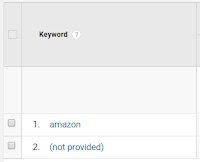Superhero Solutions
 |
| (Keyword-hero.com, 2018) |
A Hero Was Born
Do you use Google Analytics and want to know which keywords
were used for organic searches? This is one of the few pieces of information
Google Analytics does not have available within the tool itself. But have no
fear – The Keyword Hero is here!
In 2011, Google Analytics stopped showing users keywords
from “organic traffic” (Keyword-hero.com, 2018). To fill the void, Keyword Hero
was created just for that purpose. Keyword Hero helps consumers by giving them
an easily adaptable solution and allowing them to see the exact “organic
keywords” within Google Analytics, not in a third-party site (Keyword-hero.com,
2018).
How Does It Work?
Keyword Hero is a plugin compatible with Google Analytics.
Data from nine sources is pulled and analyzes from your website. Then, the
plugin “connects your users’ queries to their sessions” so you’re able to
understand which keyword was most popular and had the highest profit. Finally,
the data is uploaded back into Google Analytics from your convenience and
analysis. Keyword Hero only takes a few minutes to set up, but within 24 hours
you should start to see your unknown data become available (Keyword-hero.com,
2018). It’s important to understand the importance of this information and
install a solution, like Keyword Hero, early to make sure all data is gathered.
Unfortunately, Keyword Hero is only retroactive for three days, so you’ll see
all future data and three previous days of data after installation. (Keyword-hero.com,
2018).
Once added to Google Analytics, Keyword Hero can give
“behavioral and transactional metric per keyword” (Keyword-hero.com, 2018). Installation
of Keyword Hero is easy and only take two mins – then it’s time for the
keywords. Compared to the current 3-8% of keywords Google Analytics is already
providing, Keyword Hero will deliver about 95% of keywords available. From this
data, you can see analytics per keyword to understand what keywords are
bringing your company the money revenue compared to others and the analytics
per keyword. Other possible analytics measurements are available within Google
Analytics (Keyword-hero.com, 2018).
Why Is This
Important?
When Google changed how it gathered data in 2011, organic
keywords were left out of the mix. This left a huge gap in user data reports
for a significant number of website users. Instead of keywords being listed
with referral data, it is hidden to website managers and show up as ‘nor
provided’ on the reports. If your site has quite a bit of organic traffic, it’s
important to understand how those users are getting to the site – and more
importantly, to understand if those users are bringing money to the site
(Broadley, 2013).
 It’s important to understand the significance of this
information and install a solution, like Keyword Hero, early to make sure all
data is gathered. Unfortunately, Keyword Hero is only retroactive for three
days, so you’ll see all future data and three previous days of data after
installation (Keyword-hero.com, 2018).
It’s important to understand the significance of this
information and install a solution, like Keyword Hero, early to make sure all
data is gathered. Unfortunately, Keyword Hero is only retroactive for three
days, so you’ll see all future data and three previous days of data after
installation (Keyword-hero.com, 2018).
For example, the pictured keywords are from this blog. For
not being a large blog, I have one ‘not provided’ piece of data that I can’t
analyze. Adding Keyword Hero to my blog would allow me to see the keyword
instead of (not provided) and could give me a better idea of where my readers
are actually coming from.
Keyword Hero & Marketing
Organic keywords are “used to attract free traffic through
search engine optimization” (WordStream, n.d.). With “over 3.5 billion” Google
searches each day, you want those searches to lead to your website. Realizing
the organic keywords that bring people to your site is how you understand how to
“optimize your site pages for those organic keywords” (WordStream, n.d.).
Keyword Hero is the perfect
plugin for Google Analytics for businesses of all kinds who’d like to get a
better grasp on where their traffic is coming from and if it is profitable.
Marketers can use this information to find out who exactly to market content to
and where. Keyword Hero has multiple plans that are available for sites of all
sizes, depending on how many organic URLs you have per day. The monthly limits
and prices are broken down below (Keyword-hero.com, 2018).
 |
| (Keyword-hero.com, 2018) |
After installing Keyword Hero and accessing the data, learning exactly where organic traffic is coming from is the easy part. As a marketer, the hard part is taking the organic keyword data and analyzing it – how do you use that information to your advantage? Where do you put keywords on your site to attract people?
In general, there are a few places
to add keywords to your site that will help with organic searches. WordStream (n.d.)
lists those important areas as:
- The URL
- The title and H1 tags
- The first sentence or at least the first paragraph
- Subheads
- Image file names and alt text
- The meta description
- In links to related content
As a marketer, the key to marketing
with organic keywords is that you have to know which keywords bring visitors to
your site, where to place the keywords on your site to make it stand out in searches,
and how to craft the information together to draw the audience in and keep them
coming back.
References
Broadley, C. (2013, February 5). How to unlock your ‘not
provided’ keywords in Google Analytics.
Kissmetrics. Retrieved from https://blog.kissmetrics.com/unlock-keyword-not-provided/
Keyword-hero.com (2018). Keyword hero the SEO revolution. Keyword Hero. Retrieved from https://keyword-hero.com/?utm_source=ga_partner_gallery&utm_medium=referral&utm_campaign=app_listing
WordStream (n.d.). Organic keyword: what is an organic
keyword? WordStream. Retrieved from https://www.wordstream.com/organic-keyword


Comments
Post a Comment